Despite the severity and duration of the authoritarian resurgence and illiberal populist backlash, supporters of liberal democracy can draw on strategies and tactics to strengthen democratic resilience, reverse regression, and fend off authoritarian resurgence
That was the message of a November 5 forum at Brookings’ Governance Studies and Foreign Policy program to mark the release of “The Democracy Playbook,” a new report by Brookings analysts Norman Eisen, Torrey Taussig, and Alina Polyakova, and the Transatlantic Democracy Working Group’s Susan Corke. Following a keynote speech by Senator Ben Cardin, the authors outlined their findings, drawing upon a thorough review of social science and practitioner insights, with a particular focus on the recent European experience, to outline A Strategic Plan to Fight Democratic Backsliding.
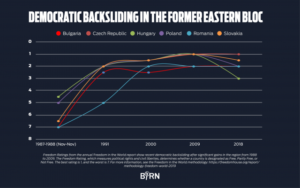 The playbook delineates strategies and tactics for pro-democracy actors “to not only push back against illiberal and authoritarian-leaning actors, but also to renew the promise and resiliency of democratic institutions,” the authors write. “To demonstrate that democracy is the best system to meet citizens’ needs, supporters will have to revitalize the economic, political, and social pillars that undergird democracy, which have, in many nations, fallen into disrepair.”
The playbook delineates strategies and tactics for pro-democracy actors “to not only push back against illiberal and authoritarian-leaning actors, but also to renew the promise and resiliency of democratic institutions,” the authors write. “To demonstrate that democracy is the best system to meet citizens’ needs, supporters will have to revitalize the economic, political, and social pillars that undergird democracy, which have, in many nations, fallen into disrepair.”
International actors have a role to play in fostering democratic resilience in regions like Central Europe, especially in the face of restrictions on civil society, the report suggests.
For example, “to foster greater resiliency before restrictions occur and in places where backsliding is already taking place, official actors including the U.S. State Department and USAID should increase longer-term support for independent civil society and investigative independent media in Central Europe, with Hungary and Poland as the most urgent priorities,” the authors argue.
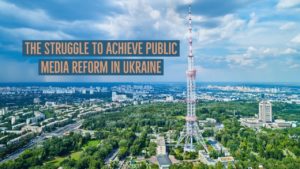 Prior to Ukraine’s nonviolent Orange Revolution of 2004, “external actors, including USAID, the Westminster Foundation, National Endowment for Democracy (NED), and the Alfred Moser Foundation had been supporting Ukrainian civil society for several years,” the authors observe.
Prior to Ukraine’s nonviolent Orange Revolution of 2004, “external actors, including USAID, the Westminster Foundation, National Endowment for Democracy (NED), and the Alfred Moser Foundation had been supporting Ukrainian civil society for several years,” the authors observe.
Given that there is now “a global field of competition that pits the community of democratic states against the opposing illiberal model pushed by powerful states such as Russia and China,” the report notes, external assistance from pro-democracy actors is critical, “but must be complementary to internal democratic reform.”
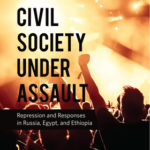 The report outlines strategies and best practices for external actors to support pro-democracy actors on the ground, including:
The report outlines strategies and best practices for external actors to support pro-democracy actors on the ground, including:
- empowering and partnering with domestic organizations;
- assisting nonviolent and civil resistance movements;
countering disinformation; - leveraging institutional and official diplomatic and economic tools in order to incentivize democratic reforms;
- exposing the fraudulent and corrupt tactics of authoritarians; and,
- enhancing the capacity and training of pro-democracy actors.
The report makes extensive recommendations for domestic and international actors, including:
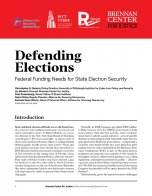 Domestic actors
Domestic actors
1. GOVERNMENT AND POLITICAL PARTY LEADERS SHOULD:
• Be prepared for and invest in protecting against internal and external interference in elections.
• Enact policies that promote and protect broad access to the vote, such as automatic or
same-day voter registration.
• Regulate the role of money in politics to retain trust in the democratic system.
• Uphold institutional obligations and use their political power with restraint–but when
norms break down, further legal mechanisms should be considered.
• Defend the independence of the judiciary by establishing public procedures for the
selection and retention of judges.
• Implement judicial transparency mechanisms.
International actors
INTERNATIONAL ACTORS SHOULD PARTNER WITH DOMESTIC
CIVIL SOCIETY GROUPS AND NGOs BY:
• 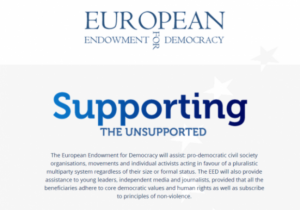 Going local—enhancing collaboration with local NGOs to balance external support to
Going local—enhancing collaboration with local NGOs to balance external support to
more well-known and Westernized organizations.
• Building basic capacities of NGOs—especially local ones.
• Coordinating donor support to avoid overwhelming recipient organization bandwidth.
• Responding vigorously to government attacks on NGOs.
• Empowering nontraditional actors in addition to NGOs, such as businesses, individuals,
universities, student groups, and think tanks.
• Developing domestic sources of funding and philanthropy, particularly in countries that
are at risk of democratic backsliding.







